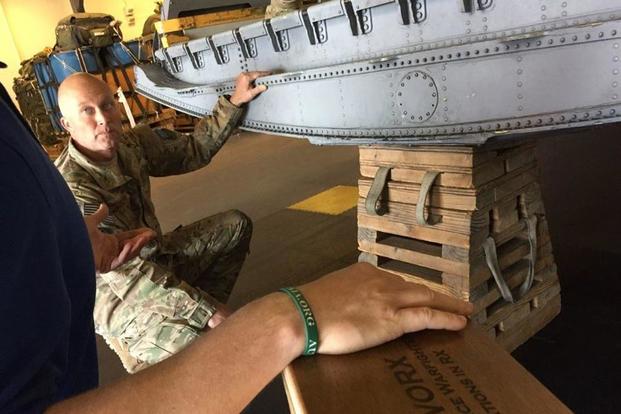The U.S. Air Force hopes to save a lot of money by switching out a lowly milk stool.
The Air Force Research Laboratory's Junior Force Warfighter Operations team (JFWORX) is re-engineering the service's current milk stool -- made of 85 pounds of wood and tough to lug around -- into a 30-pound aluminum version, according to a recent release.
The stool must be able to support up to 72,000 pounds, propping up the rear loading ramps of C-130 Hercules aircraft as they offload hundreds of thousands of pounds of gear, troops and supplies.
Without using the stool, "a heavy load on the loading ramp can cause the front of the plane to lift off the ground, like a seesaw," the release said.
C-130s have only one loadmaster, who is often moving quickly to offload supplies. The current milk stool requires two people to carry, with the loadmaster scrambling to get it adjusted quickly, the Air Force said.
Because aluminum -- low-cost, strong and corrosion-resistant -- is readily available, most base maintenance shops could whip up a new stool if it breaks or is damaged.
The stool, roughly $125 to make, also would save money by offsetting fuel costs with its decreased weight.
"Those annual savings equate to approximately $375,000 for the Air Force and up to $1.7 million if the new milk stool is adopted across the entire C-130 fleet," the release said.
The JFWORX team is using helpful insights from a couple of Air Force Academy cadets who tried to build a prototype in 2011. Their build didn't make it into production due to unmet requirements, the service said.
The team has built and tested five prototypes in the past three months. One is expected to be fielded next month for testing.
"Increasing my knowledge in other areas like welding and weld inspection, as well as providing a solution to a long-standing Air Force problem, is very satisfying," J.D. Bales, mechanical engineer and member of the JFWORX team, said in the release. "Working with all the disparate team members and utilizing their expertise has been a rewarding experience."
Full production of the stool could start as early as next year.
-- Oriana Pawlyk can be reached at oriana.pawlyk@military.com. Follow her on Twitter at @Oriana0214.










